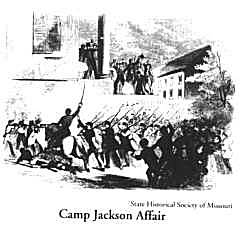THE INVASION OF CAMP JACKSON BY THE HESSIANS
(Words by Joseph Leddy; to the tune of “Happy Land of Canaan”)
|
Bob Dyer—guitar and vocal; Dave Para—guitar and vocal; Cathy Barton—banjo and vocal; Dave Wilson—fiddle; Lloyd Hicks—drums; Lou Whitney—bass
The Civil War in Missouri was triggered by the incident referred to in this song—a confrontation in St. Louis on May 10-11, 1861, between the State Guard troops of Missouri's secessionist governor, Claiborne Fox Jackson, under the command of General D.M. Frost, and a much larger contingent of St. Louis “Home Guard” German troops under the command of Union Captain (soon to be General) Nathaniel Lyon.
Anger over the incident was widespread and many people who had been wavering between neutrality and secession decided they could no longer remain neutral. By the end of May the situation degenerated into an outright split between Claiborne Jackson's secessionist State Guard led by General Sterling Price, and the Union forces now firmly under the control of Frank Blair and General Nathaniel Lyon. The words to this blatantly natavistic secessionist song were apparently written in August of 1861, less than a week after the Battle of Wilson's Creek, by Joseph Leddy of Col. Joseph M. Kelly's Missouri State Guard Regiment. The words were set to the tune of a popular melody of the time known as “The Happy Land of Canaan" parodied by soldiers on both sides during the Civil War. Several versions of such songs have been collected by Missouri folklorists H.M. Belden and Vance Randolph. Other versions have been collected in Kentucky and the Appalachians. This song was brought to our attention by Florence (Chesnutt) Friedrichs of the Pleasant Green Plantation in southern Cooper County, who found it in a scrapbook kept by her great-great grandfather, Allen Howard Conkwright, a medical doctor who served in Col. Kelly's Regiment. The complete version of the song contains fifteen verses, but we sing only six of these—the first four plus verses eight and nine.
It was on the Tenth of May, Kelly's men were all away,
Chorus
Lyon came into camp with such a pompous tramp,
Our boys looked so nice and neat, when they formed upon the street,
The people gave three cheers for the handsome Volunteers,
With Col. Kelly at our head, we will fight till we are dead—
'Twas just three months that day, since the gloomy 10th of May,
|
 Frost's troops were suspected of assembling at Camp Jackson as a
prelude to seizing the ordnance in the State Arsenal, but before they
could make their move Lyon's troops surrounded them and forced them to
surrender. They were then marched through the streets of St. Louis and
angry crowds gathered to shout insults and throw rocks at the German
“Home Guards” led by Lyon. Shots were fired and about two dozen
citizens were killed.
Frost's troops were suspected of assembling at Camp Jackson as a
prelude to seizing the ordnance in the State Arsenal, but before they
could make their move Lyon's troops surrounded them and forced them to
surrender. They were then marched through the streets of St. Louis and
angry crowds gathered to shout insults and throw rocks at the German
“Home Guards” led by Lyon. Shots were fired and about two dozen
citizens were killed.